The Toshiba XG5 (1TB) SSD Review
by Billy Tallis on August 3, 2017 9:01 AM ESTAnandTech Storage Bench - Light
Our Light storage test has relatively more sequential accesses and lower queue depths than The Destroyer or the Heavy test, and it's by far the shortest test overall. It's based largely on applications that aren't highly dependent on storage performance, so this is a test more of application launch times and file load times. This test can be seen as the sum of all the little delays in daily usage, but with the idle times trimmed to 25ms it takes less than half an hour to run. Details of the Light test can be found here. As with the ATSB Heavy test, this test is run with the drive both freshly erased and empty, and after filling the drive with sequential writes.
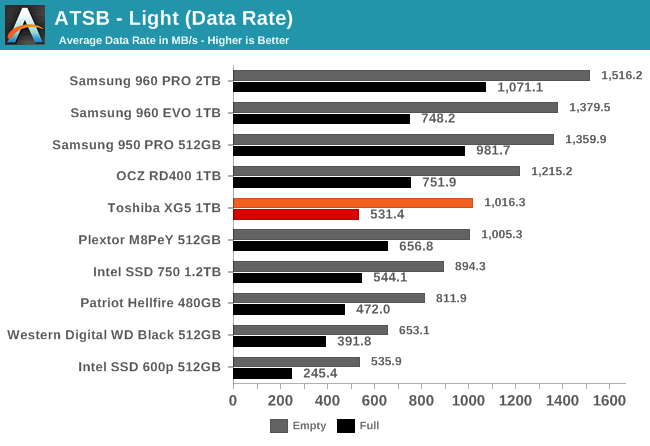
The Toshiba XG5's average data rate on the Light test ranks it similarly to how it ranked on The Destroyer and the Heavy test. The overall spread of scores is not as large on the Light test, and the Intel SSD 750 falls behind the XG5 for once. The disparity in performance between running the Light test on a full drive and an empty drive is bigger than it was on the Heavy test, but the Samsung 960 EVO also suffers by almost as much.
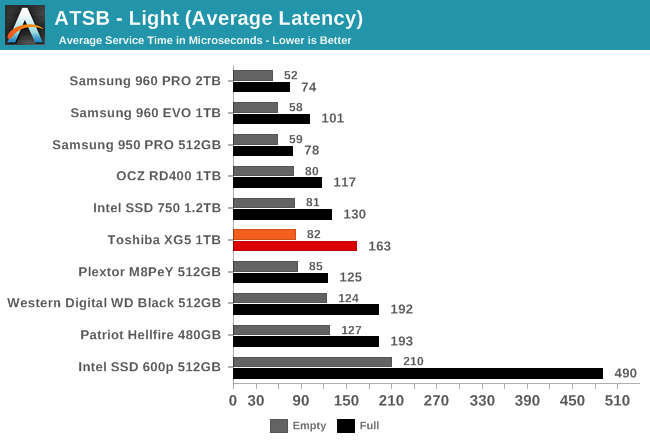
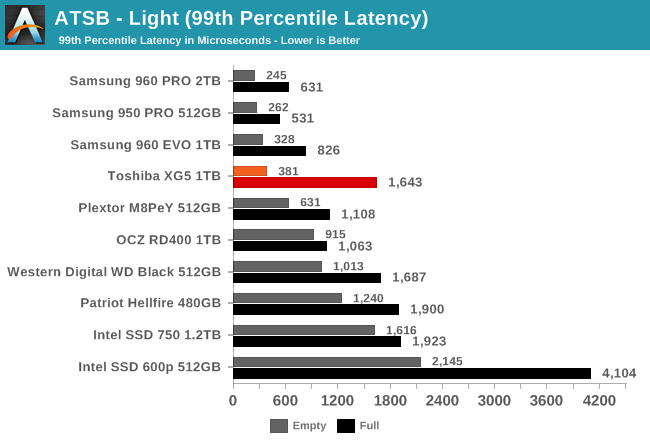
When the Light test is run on an empty drive, the XG5's average latency puts it in the second tier of NVMe SSDs, virtually tied with the RD400, Intel 750, and Plextor M8Pe. The 99th percentile latency of the XG5 is much closer to the Samsung drives at the top of the chart than to any of the other competitors.
When the Light test is run on a full drive, the XG5's average and 99th percentile latency are only slightly ahead of the slow TLC drives and the Phison E7-based Patriot Hellfire.
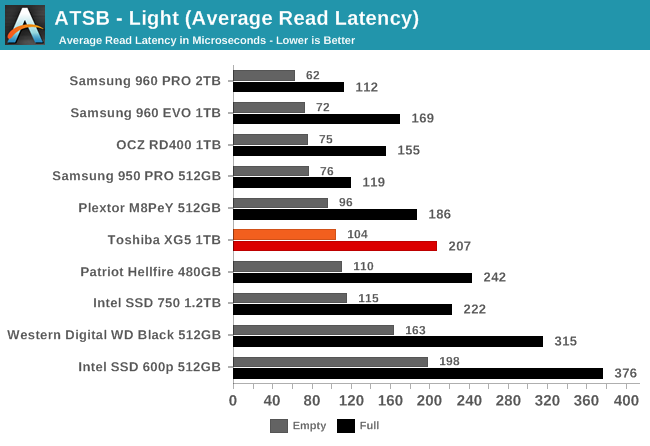
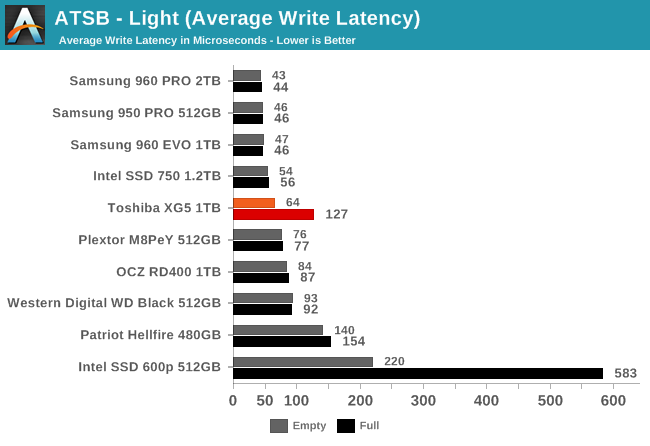
The average read latency scores on the Light test place the XG5 in the middle of the pack. Even though almost all drives show substantially higher read latency when full, everything is plenty fast and the differences in won't matter in practice. The average write latency scores are similarly closely clustered and almost all very fast, but the Toshiba XG5 stands out as one of the two drives that scores significantly worse when full.
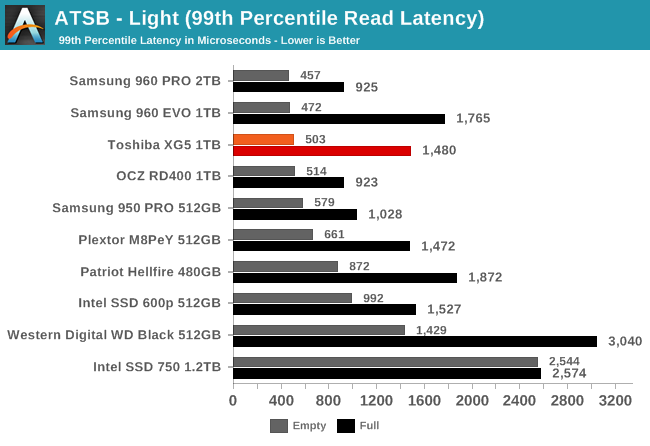
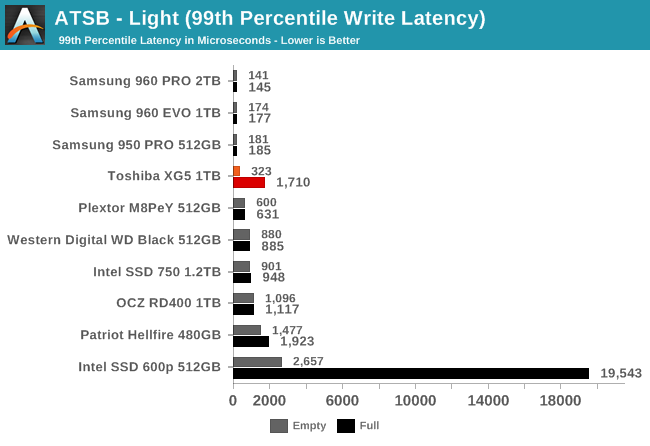
The 99th percentile read latency of the Toshiba XG5 on the Light test is very good, trailing just behind the Samsung 960 EVO when the test is run on an empty drive and scoring modestly better than the 960 EVO when the drives are full. The 99th percentile write latency of the XG5 isn't as close to Samsung but is still great then the drive starts out empty. When it's full, the XG5 does start to lose its stellar quality of service but doesn't land all the way at the bottom of the chart.
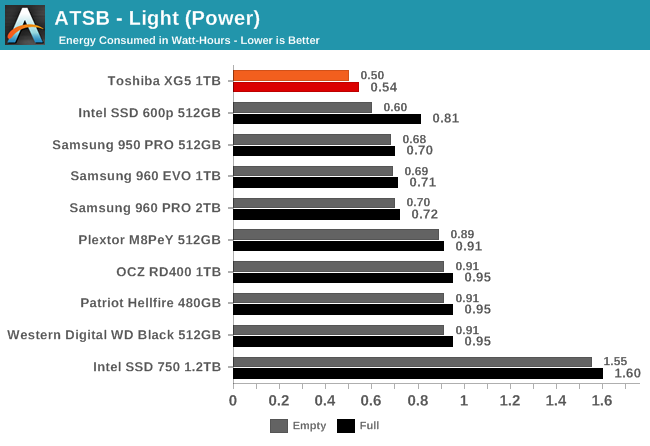
The Toshiba XG5 continues its sweep of the energy efficiency scores with another record for NVMe SSDs. The Samsung drives use more than 30% more energy over the course of the Light test, and most of the competition is closer to 70-80% more power hungry.










28 Comments
View All Comments
Hurr Durr - Friday, August 4, 2017 - link
Honey, Samsung IS South Korea.Kristian Vättö - Thursday, August 3, 2017 - link
Look at it from the other perspective. If it wasn't for Samsung, companies like Apple, Dell, HP etc. would barely have any product to sell. The US hasn't been strong in memory for decades and even today Micron is still just a drop in the ocean from overall wafer production point of view.Samus - Thursday, August 3, 2017 - link
Indeed.Santoval - Friday, August 4, 2017 - link
I think you are swimming in conspiracy theory waters. Since there is no legal way to target Samsung specifically, the only way for what you are suggesting is by slapping heavy tariffs on South Korean imports in the US. But that is a dangerous slippery slope, since it could be the start of a global tit-for-tat tariff war. Now, I do not say that Trump is not crazy or stupid enough to not go there, but I still do not think he will do it, because hopefully cooler heads will prevail. If he does the US will be completely isolated, and since it is a major part of the global economy, the 2008 - 2010 crisis will seem like peanuts.Reflex - Thursday, August 3, 2017 - link
Don't bother asking him that, it'll just turn into conspiracy theory bullshit.Ratman6161 - Monday, August 7, 2017 - link
This is the second AT story I've read today where the comments devolved into a flame war within the first page. If everyone would just stop feeding the trolls I think things would be a lot better. As it is, the comments area is rapidly reaching uselessness.cfenton - Thursday, August 3, 2017 - link
They would have to undercut the 500GB EVO by $75-$100 and the 1TB by $100-$150, at least, to make this thing compelling. Though, to be honest, I haven't noticed a huge difference going from a BX100 to a 960 EVO in everyday performance. It's certainly better for demanding tasks, but that's not important for a lot of people.Sivar - Thursday, August 3, 2017 - link
The technical detail and comprehensiveness of this SSD review is impressive.It must have taken man weeks to put this all together.
Billy Tallis - Thursday, August 3, 2017 - link
It did take quite a while to put together the new test suite, and re-test older drives for comparison data. The Intel 750 is a particular nuisance since I only have equipment to measure one power rail at a time and the 750 uses both the 12V and 3.3V lines.Now that I have the new test suite (mostly) complete and automated as much as possible, I hope to be able to churn out reviews more quickly. There will be another SSD review going up next week while I'm at Flash Memory Summit.
Ratman6161 - Monday, August 7, 2017 - link
AT is my go to place for SSD reviews. I like the consistent testing procedures over time which really helps to do apples to apples comparisons. One thing I' would like to see though is more comparisons of different sized drives in the same brand/model family.For example I was recently shopping for an NVMe drive and Samsung has been my go to brand for a few years now for high-mid range with crucial for my more run of the mill drives. So of course I was considering the 960 EVO. The trouble was I didn't need or want to pay the price for a 1 TB model (have a 750GB MX300 for bigish storage)...the 256GB was more in my price range. But you only usually have results for the 1 TB model. Digging around on other sites I was able to determine that the 256GB model took a huge performance hit compared to the larger sizes. In the past, Samsung drives used to seem like they took less of a hit when down sizing capacity, which was another plus for the brand. I ended up with a 512 GB Evo as a good balance between price and performance...but there were a lot of guesswork and assumptions involved with that choice.
I can't be the only one out there that thinks this way?